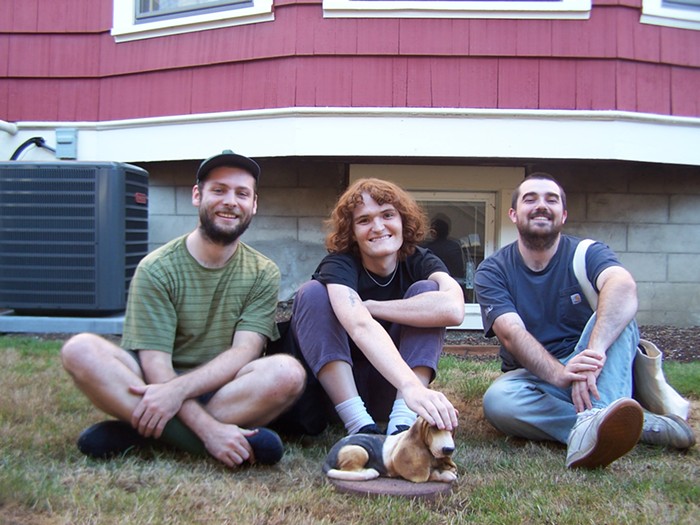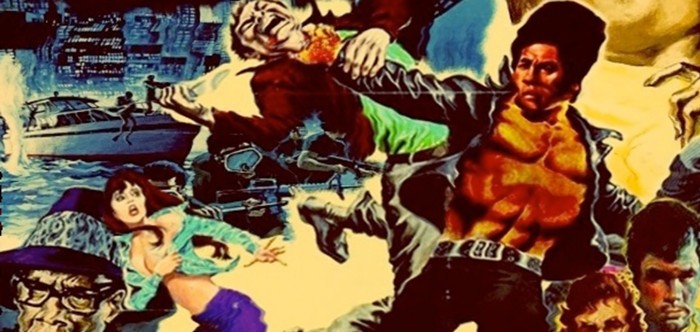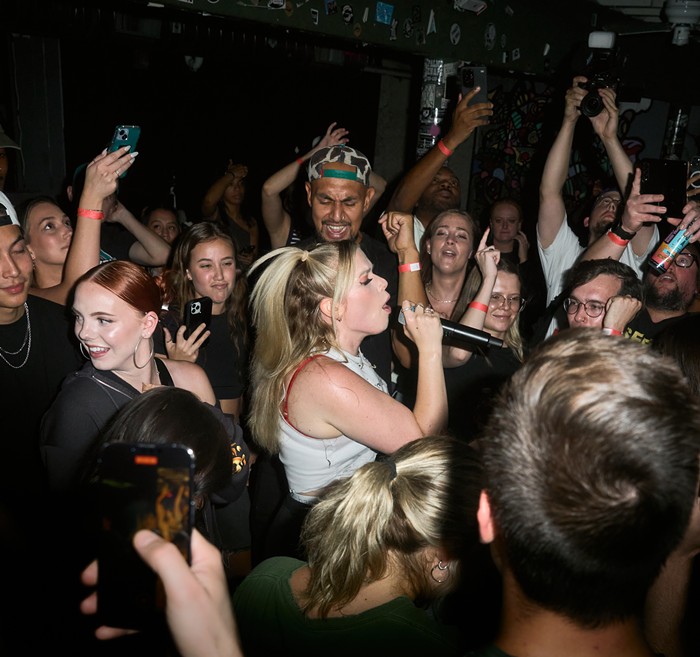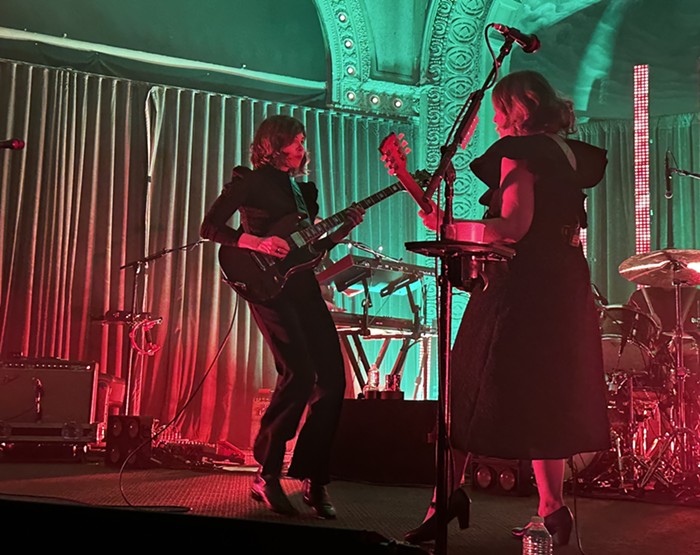I am not wanted at the Bi-Mart Willamette Country Music Festival.
For better or worse, I’ve grown accustomed to getting into shows and music festivals for free. Along with the hate mail, it’s the main perk of being a music writer. Event organizers can be almost slavishly accommodating; after all, they’re vying for positive PR.
But the Bi-Mart Willamette Country Music Festival—or BMWCMF as it will be henceforth referred to—clearly does not care about positive PR. In that way, the BMWCMF is unlike any music festival I’ve ever been to. It also perfectly embodies Oregon as it exists outside of Portland: rural, rugged, and rude. Attempting to acquire a media pass feels more like haggling with a stranger on Craigslist.
More than two months in advance, I speak with someone at Country Music Concerts, the promotions company that organizes BMWCMF. Her name is Lori, and while she won’t definitively respond to my request, she makes me feel optimistic.
Exactly two weeks later, I follow up, and this time the person on the other end is singing a different tune (namely, the tune of Clint Black’s “A Good Run of Bad Luck.”) “We’ve already sent out our press passes, so if you haven’t received one, then it’s probably too late,” she tells me. I explain I already spoke with someone named Lori who made me think I was good to go. “My name is Lori,” she says. “You must have been talking to the other Lori.”

Per this Lori’s request, I send an email to Mickey Miles, who I’m led to believe is running the festival’s press campaign. The response I get from Miles is definitive: “We aren’t going to be able to accommodate you at this time,” the email reads, “for a variety of reasons.” In an era of heightened industry favor-swapping, it feels oddly refreshing having a promoter tell me to go fuck myself. (With a polite tip of their hat.)
This year’s BMWCMF lasts four days in August. This is its 10th year, and it’s always occurred in Brownsville, Oregon, a town located between Salem and Eugene with fewer than 2,000 people; it’s probably best known for providing the setting for Stand by Me. On Thursday, I rush to make Thomas Rhett’s evening performance. I queue up Eric Church’s “Knives of New Orleans” from his staggering 2015 LP Mr. Misunderstood and hit the single-lane highway at a smooth 45 miles per hour, much to the palpable frustration of the F-250s lining up behind me. This is probably the loudest anyone has ever listened to Eric Church in an neon green KIA Soul. Mere seconds after the climactic drop (“I did what I did!/I have no regrets/When you cross the line/You get what you get”), I lose cell service and the song stops in its tracks.

Upon arrival, a canopy and lone tractor inconspicuously mark the entrance to the general admissions parking area: a mile-long dirt path divided into makeshift lanes by flags and stanchions. I find myself off-roading in my Kia Soul, in what feels like the ultimate qualifying test—the car’s alien-green finish is now more of a desert camo.
When I finally reach the gate, a festival volunteer asks me if I need to buy a parking pass. There is very little information regarding parking passes on the BMWCMF’s website other than that they exist and will be more expensive if purchased onsite. It turns out parking passes are $60 and are only purchasable with cash. I see at least one other car turned away for this reason, and it strikes me as a glaring organizational fuck-up. “If you don’t have cash,” the volunteer tells me, and I don’t, “you can go back to the highway and take a left. In about six miles, you should reach a store that has an ATM.” I spend the rest of my evening at a Shari’s in Lebanon instead. I am a poseur.
“Beautiful Views, Ice-Cold Beer, Great Entertainment”
I’ve wanted to go to the BMWCMF since long before I started listening to country music. I remember being younger and seeing a massive advertisement for the festival near the entrance to the Broadway Bridge and thinking that Brownsville was a funny name for a town. Despite being heavily advertised here, the fest has only barely been discussed in Portland’s music media (OregonLive has published a few short pieces on the festival over the years, and in 2014, it was a contender in the Mercury’s “Worst. Night. Ever!” series. It got last place.)
But this makes sense, given the BMWCMF’s apparent reticence in dealing with writers from Portland. When I finally figure out the parking situation the following day and pick up my regular-joe ticket, I explain to volunteers at the booth that I’m writing a piece on the event for a Portland publication. They look at me like I’m the ghost of Bobby Kennedy speaking in backward Reptilian. “If you don’t have a media pass, we don’t really know what to tell you,” one of them says.

I finally find a festival employee who agrees to grant me a short interview, despite my civilian, non-accredited status. Her name is Josie Hankins, and she’s the office administrator for Country Music Concerts. She tells me I probably just applied for a pass too late. (She’s nice about it, but I have a difficult time reconciling this with the “for a variety of reasons” email.) I say that I hardly ever hear anyone in Portland talk about the festival, and she doesn’t seem too surprised.
“The lyrics really hit some people,” Hankins says. “I listened to country growing up, in my dad’s pickup truck, and that means so much to me out here. I think a lot of people share a similar experience, and there’s kind of a kinship between country music fans. We all love to be out here and have a good time: beautiful views, ice-cold beer, great entertainment.”
My dad had a pickup truck when I was growing up, too, but I never listened to country. Modern country went from being something I despised out of reflex, to something ingested passively and privately, to something consumed voraciously and with little shame (but a lot of critical thought). Two years ago, the tape deck and CD player in my old car broke. This was the genesis of my love affair with 99.5 The Wolf—Portland’s premiere country radio station.
Like yard sales and record store dollar bins, radio is a treasure trove for the insatiably curious. (This is why college and community stations are so vital.) When I heard Maren Morris’ “My Church” on the Wolf for the first time, it was an accident. This element of discovery has mostly been supplanted by pay-to-play content and the “Listen to This if You Want to Be Cool” playlists curated by the Spotify illuminati.
A panegyric on classic country (“When Hank brings the sermon/And Cash leads the choir”), “My Church” is a great song that none of my friends would have ever recommended to me. Eric Church’s “Record Year” boasts a similar conceit: “Keeping this turntable spinning/Everything from Jones to Jennings.” Both “My Church” and “Record Year” are analogs for the idiom’s self-rediscovery; they reference classic country expressly, but also sonically.
“There are a lot of negative stigmas that come with modern country music,” musician Mark Mackay tells me. Mackay plays the slightly less-than-desirable 9 am slot on the third day of the festival at the Sunrise Stage—a smaller stage showcasing less-prominent acts.
“There are a lot of people who think it’s gotten too poppy, or too rock ’n’ roll and away from the traditional stuff,” he says. “I think what’s interesting is, and I can’t speak for all of them, but the majority of these artists who are sort of pushing the limits and trying new things, they still love Waylon Jennings, and they still love Willie Nelson. The genre evolves, but I don’t think the roots have gone anywhere.”

Another singer/songwriter, Kelsey Waters, tells me, “One thing people don’t really acknowledge is that Nashville—and [a lot] of these people come from Nashville—is full of really talented writers who do it all day long, every single day. I think people discredit that when they see someone like Kip Moore get onstage, and maybe they’re a ‘true’ Johnny Cash fan and they’re like, ‘This isn’t real music!’ But the truth is that it is.”
Country music—and modern country music, in particular—is so easy to imitate because of its strict adherence to formula. I imagine writing a decent country song is similar to assembling a bedframe from IKEA: You’ll figure it out sooner or later if you follow the instructions, but you have to be sort of a genius to get it in one go.
“A Red-Solo-Cup-Motivated Decision”
In some ways, the BMWCMF is more enjoyable than other music festivals I’ve been to. It doesn’t trigger my agoraphobia. There are corn dogs everywhere. I’m only experiencing mild swamp-ass. It is, by nature, a more family-friendly festival, which means that belligerence is not tolerated. (Open containers are supposed to be relegated to a Budweiser-sponsored beer garden at the back of the festival, although I see several people breaking this rule.) But in other ways it is, predictably for someone not entrenched in the lifestyle, uncomfortable.

I spot a few geographically confused confederate flags. I am immediately reminded of my Jewishness, which, in the wake of white nationalists marching through Charlottesville shouting “Jews will not replace us,” is not the ideal piece of baggage to be carrying in a country music festival.
“Nice hair,” an attendee remarks in reference to my biblical mane, as we, fittingly, pass each other outside a portable toilet; I hear her and her friend chuckle behind me.
A labyrinthine RV lot for onsite campers connects the parking area to the main gate. Ducks, Beavers, and American flags serve as the backdrop to barbecues, inflatable pool parties, and intense games of beer pong. Someone interrupts one such game of beer pong to make fun of my hair. “You need some shampoo?” he asks. I tell him no.
For many country fans, the BMWCMF is paradise. As I make my way through security at the main gate, I’m force-fed an olfactory lasagna of halitosis, body odor, and Bud Light. Food trucks, stands selling cowboy paraphernalia, and a variety of other pop-up booths (my favorite being the Grizzly snuff peddler) encircle the massive main stage. The smaller Sunrise Stage is in another area entirely, separated by a connecting gate, like a small, barren planet orbiting a red-hot sun of American hedonism.
But not everyone at the BMWCMF is here for the music, man, which is consistent with every other music festival. In the RV area, I bump into some kids nursing red Solo cups who strike me as the embodiment of disaffected youth; these are the antagonists in the “Just say no to pot” PSAs. (They agree to have their photo taken, “but only if the cups are in the shot.”)
“I feel like a lot of people don’t come here for the country music,” says one of the kids, Xavier Bonds. “They come here because it’s a place where you can go out and party in public in a hayfield.” This is an astute observation—even during the headlining acts, the camping areas remain full of festivalgoers like Bonds and his friends, who couldn’t give less of a shit who’s playing. “This is just the big festival we go to on the yearly,” he says, adding that he lives about 20 minutes away in Albany. “It was a red-Solo-cup-motivated decision. It’s honestly more of a drinking festival than a country music festival—but that’s a part of country.”
I ask Bonds why he doesn’t like country music. “Because I like rap music,” he says.
It can be hard to appreciate country music—in a live setting, particularly—without also being filled with immense self-embarrassment. Country fans and artists will rattle on about how country is a “storytelling genre.” Likewise, live performances by country acts are characterized by lengthy bits and song intros. These are usually obnoxious.
“This is a song about all the girls with big asses out there,” country heavyweight Randy Houser says during one such intro. Earlier in the day at the Sunrise Stage, singer/songwriter Jeremy McComb—who formerly served as Larry the Cable Guy’s tour manager—introduces his song “Unstable” in an awkward but quintessentially country fashion: “I hope wherever she is, she’s happy and healthy... and buried under a John Deere tractor somewhere.”
“I can’t believe he said that,” Kelsey Waters tells me. “If a girl were to get up and say that, and talk about a boy being pinned under a John Deere, people wouldn’t find it as humorous. Men especially would be a little bit offended.”

A Gallup survey conducted in 2004 concluded that 60 percent of country music fans skew Republican. If that number seems shockingly low, consider that 11 percent of those polled identified as liberals, while the remaining 30 percent identified as “political moderates.” When music snobs champion the comparative “realness” of classic country, they neglect to mention the genre’s long-standing history as rallying cry for modern conservatism. As Jon Savage writes in his book 1966, the loudest musical support for the Vietnam War occurred, non-surprisingly, in classic country songs, like Marty Robbins’ “Private Wilson White” and Ernest Tubb’s “It’s for God and Country, and You Mom (That’s Why I’m Fighting in Viet Nam).”
Still, a misconception persists that the only people who like modern country are conservatives oblivious to issues like the ones Waters alludes to. But this is not the case. The modern country industry has, pretty publicly, been at odds with itself over the legitimization of female artists since at least 2015, when the Nashville-based publication Country Aircheck published a bizarre and inflammatory remark by country radio consultant Keith Hill. “If you want to make ratings in country radio, take females out,” Hill said. “Trust me, I play great female records and we’ve got some right now—they’re just not the lettuce in the salad. The lettuce is Luke Bryan and Blake Shelton, Keith Urban, and artists like that. The tomatoes of our salad are the females.”
“I have so many really talented friends [in Nashville] who are trying to make it happen, and I do think they have to work a lot harder for some reason,” Waters says. “I don’t know what’s wrong with the listening world. They work just as hard and play their instruments just as good as a guy, and everyone is aware of that. But if you look at it, how many country women played [the Willamette Country Music Festival]? How many women country artists are on the radio, comparatively?”

Only three female artists played the BMWCFM’s main stage; the majority of female artists at this year’s festival were relegated to the Sunrise Stage.
The sentiment buried at the bottom of Keith Hill’s mixed salad analogy is echoed by at least one of the artists I speak with. “A lot of women are very offended because they’re underrepresented by country radio, [but] I’m not one of them,” says Jo Smith, who played the Sunrise Stage on the last day of the festival. “And that doesn’t mean I’m not extremely pro-woman. I am, obviously—I’m a female. I tend to look at things positively, and I think it’s just that maybe females have to up their game.
“This is probably a risky thing for me to say, but I’ll be honest, at the time when women weren’t very underrepresented on the radio, I wasn’t buying female records because I didn’t like them,” Smith continues. “And now that females are represented on the radio, I feel like it’s because they’re great.”
When I broach the topic to festival staffer Josie Hankins, even she seems to mince words. “I do wish we saw more women in country music,” she tells me. “There’s actually a song called ‘Girl in a Country Song’ that has the lyrics, ‘You just want me to shut up and ride along.’ Sometimes I feel like country music concerts bring a more right-wing approach to things... not that I’m discriminating against anyone with those politics. We do try to get good representation of females in country music out here.”
As I’m driving home and listening to Blake Shelton’s 2016 tour de force If I’m Honest, I wonder if the reason some people hate modern country is because they think it’s barely strayed from its roots. If that’s the case, those people may not be listening closely enough.
The cliché exists among Portlanders that we occupy a liberal oasis in a conservative wasteland. And at first glance, the BMWCMF feels like a microcosm of that other Oregon—from the copious camo and confederate imagery, to the makeshift steak-outs and chewing tobacco dispensaries.
Modern country provides the soundtrack to this lifestyle, but it might not forever. The industry’s younger, more progressively minded inheritors—which include artists like Waters—hint at an encouraging future where Nashville radio gold isn’t encumbered by ancient ideas, and where upholding tradition doesn’t automatically mean a collapse into anachronism. Maybe that trajectory wasn’t always apparent on the Bi-Mart Willamette Country Music Festival’s main stage, or in its RV-clustered, red Solo cup-littered parking lots.
But there’s always next year.


















